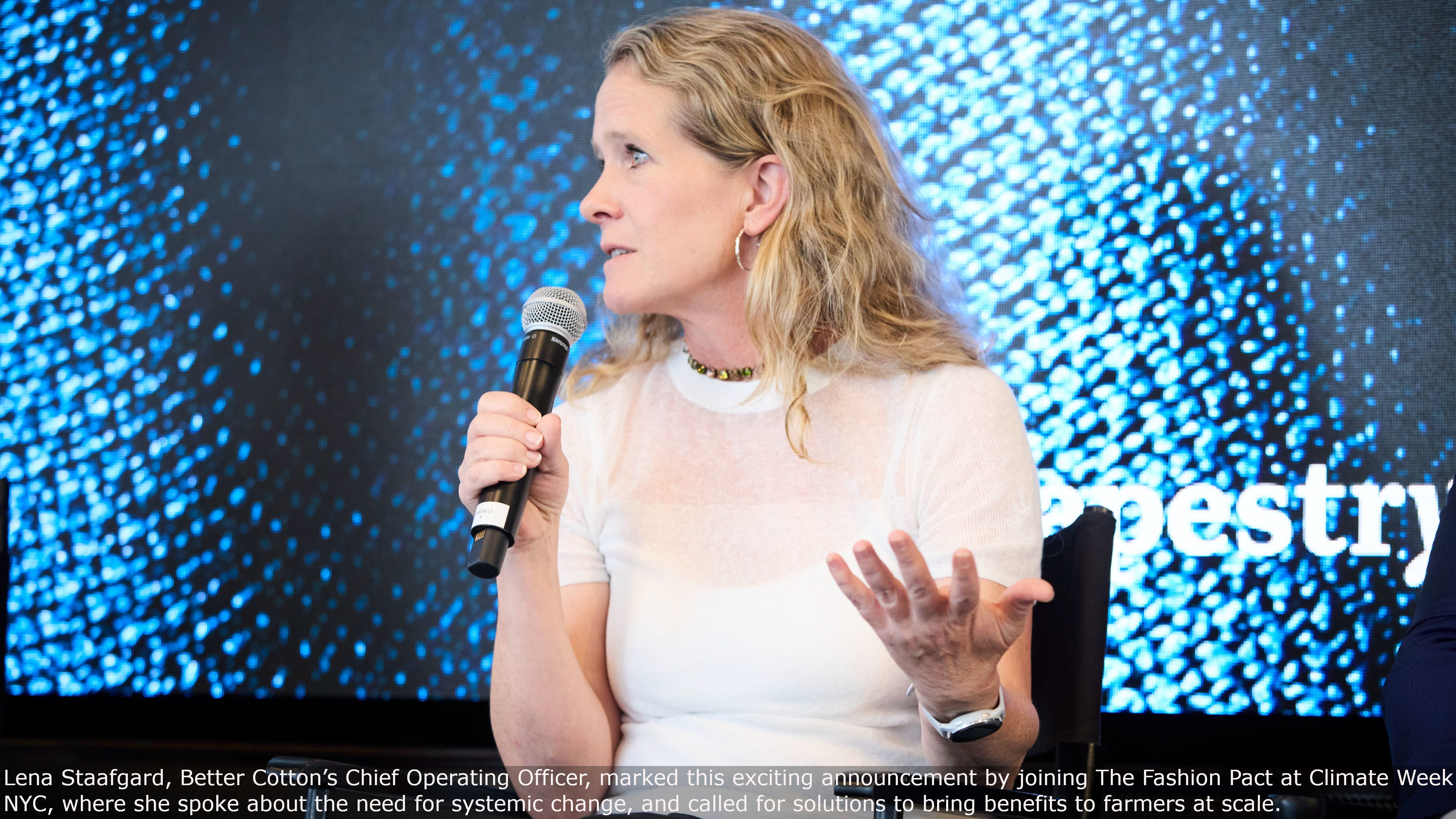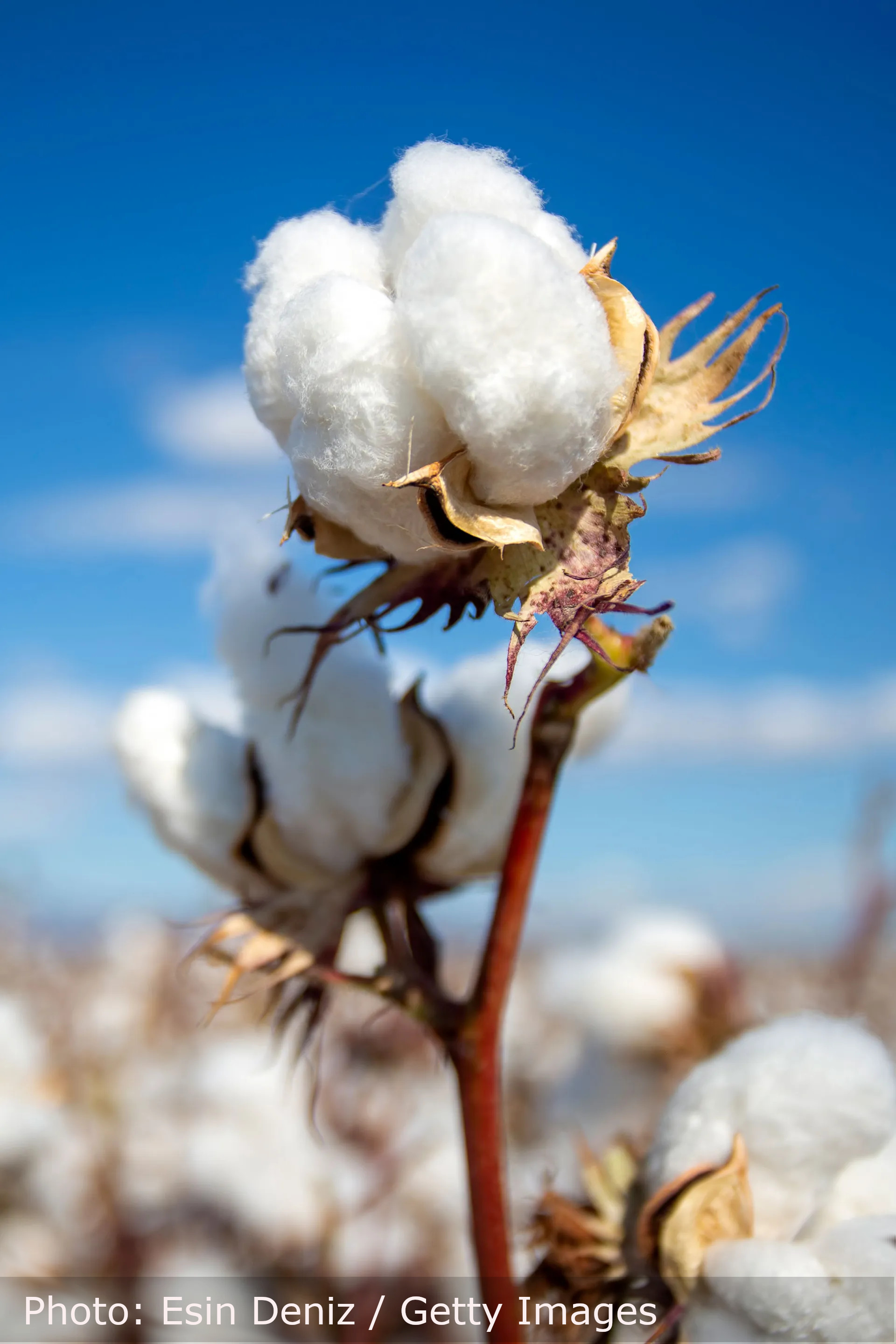
Category: SUSTAINABILITY
Country: United States
Unlock creates incentives for farmers to transition to regenerative practices, helping brands to decarbonise their supply chain. After a successful pilot, the programme is ready to scale.
By Maliha Shoaib
25th September, 2024
GTS_NewsFeed
The fashion industry urgently needs to decarbonise its supply chain to limit dangerous temperature rises and severe climate impacts, experts say. Raw materials can make or break a brand’s climate targets — constituting as much as two-thirds of a brand’s climate impact, according to Boston Consulting Group. The problem is there are few low-impact raw materials and even fewer incentives to transition how they are produced, particularly within agricultural systems.
“The way the system works today, there’s a lack of incentive for farmers to switch from conventional production to more low-impact production, and there’s also a burden for brands to directly connect with farmers in order to claim greenhouse gas (GHG) reductions and removals directly. It’s a systematic issue, and it needs the weight of the industry behind it,” says Eva von Alvensleben, executive director of The Fashion Pact, a non-profit initiative founded in 2019 to foster cross-industry action towards net-zero, led by CEO engagement.
The lack of incentives makes it hard for farmers to transition their practices, given the financial risks involved in addition to the need for data and collection that most farmers don’t have the proper infrastructure for. But demand for more sustainability materials is expected to spike in the coming years — with demand exceeding supply by 133 million tonnes by 2030, according to Boston Consulting Group — as brands can’t achieve their sustainability targets without them. “We don’t have enough low-impact raw materials” for brands to manufacture their collections from, says von Alvensleben. “There is a concrete need to invest in that raw material stage.”
To fill that gap, The Fashion Pact has set up the Unlock programme, in partnership with sustainability consultancy 2050 and climate innovation NGO Future Earth Lab. Unlock, which began as a pilot in 2023 and is now set to scale beyond that initial test, offers financial incentives to farmers while allowing brands to invest in regenerative farming and purchase cotton grown using more eco-friendly practices. The programme doesn’t incentivise organic in addition to regenerative practices (one does not mean the other), but says it can include organic and some farmers currently enrolled are committed to transitioning to organic. The programme partners with Better Cotton, Climate Beneficial Verification Programme and Staple Cotton Cooperative Association among others, though Unlock itself is a certification-agnostic system, meaning it’s flexible and can be used with a variety of certification programmes.
Right now, cotton is the focus given its ubiquity and resource-intensive farming requirements, but there’s potential to expand to other materials, too.
 The pilot phase in 2023 resulted in between 200 kg and 600 kg of carbon reductions per hectare in India and an average of 950 kg of removals and 2000 kg of reductions per hectare in the US. The programme is funded in part by the Laudes Foundation (which donated a €200,000 grant), and brands, who have shared over €300,000 cumulatively to support the pilot. The Fashion Pact supported the pilot by funding 2050’s work directly. Among the 25 brands that have participated in the pilot phase are Burberry, Armani, Diesel, Adidas, Moncler, Zegna and H&M Group.
The pilot phase in 2023 resulted in between 200 kg and 600 kg of carbon reductions per hectare in India and an average of 950 kg of removals and 2000 kg of reductions per hectare in the US. The programme is funded in part by the Laudes Foundation (which donated a €200,000 grant), and brands, who have shared over €300,000 cumulatively to support the pilot. The Fashion Pact supported the pilot by funding 2050’s work directly. Among the 25 brands that have participated in the pilot phase are Burberry, Armani, Diesel, Adidas, Moncler, Zegna and H&M Group.
The pilot showed that the programme has to be localised to succeed. “One of the major elements we tried and didn’t always land was around how you use Western developed solutions and adapt it to a Global South context,” says Laila Petrie, managing director of the Future Earth Lab. For example, boundary mapping was noticeably different; in the US, fields tend to be mapped already, whereas in India, partners would have to map each field themselves. “For this programme to scale we have to understand that a lot of cotton farmers and agriculture are contexts where you can’t make assumptions about what’s available, you have to adapt and think about those contexts.”
By creating incentives for farmers, the programme seeks to ensure that the agricultural decarbonisation burden doesn’t disproportionately fall on farmers and suppliers in the Global South. Through Unlock, farmers can access training to help them implement changes and report on data related to their practices, quantifying the GHG impact and issuing outcomes-based financial incentives called “Unlock Units”. Along with climate impact, the system also measures biodiversity, water, soil and livelihood outcomes.
Brands can buy Unlock Units for $135.50 each, which are distributed as cash payments to farmers to secure their livelihoods and allow them to invest in new on-field technologies (or cover the cost of investments that have already been made). The units are distributed to farmers according to their level of GHG emissions improvement. Unlock Units can be used as claims in Scope 3 inventories, delivering a return on investment in terms of GHG reduction and removal — all of which is measured in line with their reporting needs. There’s no minimum threshold to purchase Unlock Units, meaning brands can purchase a small scale to test within their system.
“The question here is how we find mechanisms that can be local but at the same time have the potential to scale. The pilot showed us that there is this ability to do both at the same time,” says von Alvensleben.
The programme is gearing up to scale with more than 10,000 cotton farmers enrolled across India and the US for 2024. The aim is to achieve at least 10,000 tonnes of GHG emissions reductions and removals and provide up to €1.2 million worth of payments to farmers. The organisations are asking brands to join the working group and enrollment phase (which is still open for 2024), offering information on their cotton volume requirements, sourcing locations and how their current GHG accounting system works, so Unlock can meet that demand.
Balancing supply with demand is essential. “The more demand we have, the more farmers we can enrol. We’re keen to keep an open feedback loop with farmers to make sure the programme is working for them — that includes making sure their payments are a sufficient incentive and trying to give them a representative voice within the programme so we’re meeting their needs. We also give them really detailed feedback on where they did well and where they have opportunities to further improve their impact,” says Petrie.
In the long-term, the programme could expand to additional sourcing markets and to consider materials such as wool that could be applied within this system. Unlock is also looking beyond fashion. Regenerative farming requires crops to be rotated across different fields over time (which is better for the quality of the soil), so cotton will often be rotated with a food crop like wheat or soy. “The food industry is the obvious next place to engage in terms of Unlock,” says Petrie. “The fashion industry has a very overlapping supply chain and it lends really well to collective efforts in pre-competitive platforms. It’s a really good way of incubating these aligned systems that are probably useful in all industries.”
For von Alvensleben, the programme is a clear indicator that fashion needs to foster collaboration to reach its climate goals. “The fashion industry is not naturally known for collaboration. It’s very competitive. But what we’re seeing currently is that in this pre-competitive space in sustainability, there’s a huge amount of collaboration and a willingness to share,” says von Alvensleben. “There’s an understanding that we need a collective approach to these issues because they’re too systematic for any company to solve on their own.”
Courtesy: voguebusiness.com
Copyrights © 2025 GLOBAL TEXTILE SOURCE. All rights reserved.